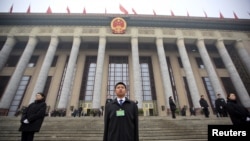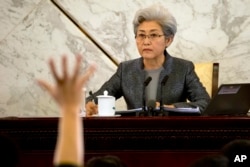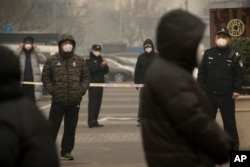China's National People's Congress (NPC) begins its annual meetings Saturday, and there are a number of key pieces of legislation the country's top legislative body may review that have already raised concerns both at home and abroad.
Some of the controversial measures include a Foreign Non-Governmental Organization (NGO) Management Law, State Security Law, and the Counterterrorism Law, as well as proposals to protect lawyers.
On Friday, in a letter addressed to NPC chairman Zhang Dejiang, the international rights group Human Rights Watch urged the nearly 3,000 delegate body to reject or revise laws that threaten domestic and international human rights guarantees.
China’s assaults on free speech, peaceful protests and human rights defenders by the Xi Jinping administration have been unrelenting, wrote Sophie Richardson, China director of the U.S.-based group.
“Any efforts the NPC can make to reject rights-eroding legislation will be a glimmer of hope for people across China,” she wrote.
The rights group urged the congress to bring controversial legislation, including a Charity Law, into conformity with similar international legislation and standards.
Sharing similar concerns last week, the ambassadors to Beijing of the United States, Canada, Germany, Japan and the European Union also voiced their concern about laws on counterterrorism, cyber security and the management of foreign NGOs, which they say will “have the potential to impede commerce, stifle innovation, and infringe on China’s obligation to protect human rights in accordance with international laws.”
The foreign NGO management law, in particular, tops the worry list of the China Human Rights Lawyers Concerned Group. It is expected to give China’s police extensive power to impose fines, disperse social gatherings or conduct raids without due judicial process or supervision, said Kit Chan, the group’s Hong Kong-based spokesperson.
“This kind of limitation is not clear. It’s just like any other Chinese laws at the moment, namely, Criminal Law or the Criminal Procedure Law that we see, there are a lot of vague and imprecise terms being used. Then, eventually, it will go into the interpretation by the police,” Chan said.
NGO regulation needed
But NPC spokeswoman Fu Ying rebutted such criticism, saying the law is well-intended to regulate the growing number of foreign NGOs in China, which is currently at 7,000.
“[The law] aims to provide a more regulated legal environment. It isn’t meant to prohibit or restrict foreign NGOs’ beneficial or legal activities in China,” Fu told an international news conference, praising the good work of NGOs in fighting desertification in her hometown of Inner Mongolia.
Rights groups argue the controversial laws highlight China’s efforts to use legislation to tighten controls on society in the name of national security.
“Now it’s not just about the law, it’s anything that they [China] are going [use] to control the civil society is being put under the pretext of national security,” Chan said. “The thing is we don’t really see any clear evidence of proof that they can present to justify.”
Like other rights groups and diplomats, Chan expressed hope that NPC delegates can take the private sector’s voices into consideration when amending the laws.
Party rubber-stamp
But Zhang Qianfan, a law professor from Peking University, advised activists not to get their hopes up.
“The civil society hopes to have their voice heard during the [NPC] meetings or invite more attention. But the NPC isn’t an important policy-making body at all. Although it is so stated in the Constitution, the NPC is seen by many only as a rubber-stamp [for party decisions],” Zhang said.
In defense of the NPC, Fu said its upcoming sessions will be vital in facilitating a sound legal environment for China.
When asked to comment on the recent crackdown of rights lawyers, Fu gave a diplomatic response.
“We’re now actively promoting the rule of law. A healthy array of lawyers is important to properly implement the nation’s laws and regulations while maintaining social equality and justice… Meanwhile, lawyers’ rights to practice law should be protected,” Fu said.
Both Zhang and Chan called the response ironic lip service.
According to statistics of the China Human Rights Lawyers Concerned Group, 317 lawyers and their associates have been arrested, detained, under residential surveillance or missing, as of Friday. A majority of those who run into trouble with authorities for their work have also been denied of legal representation.














